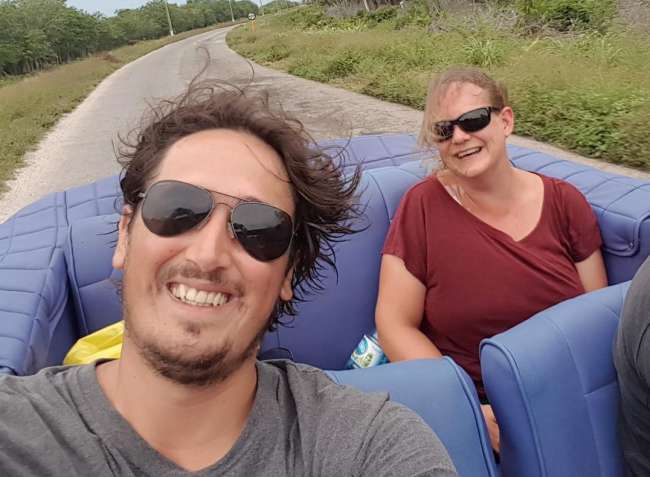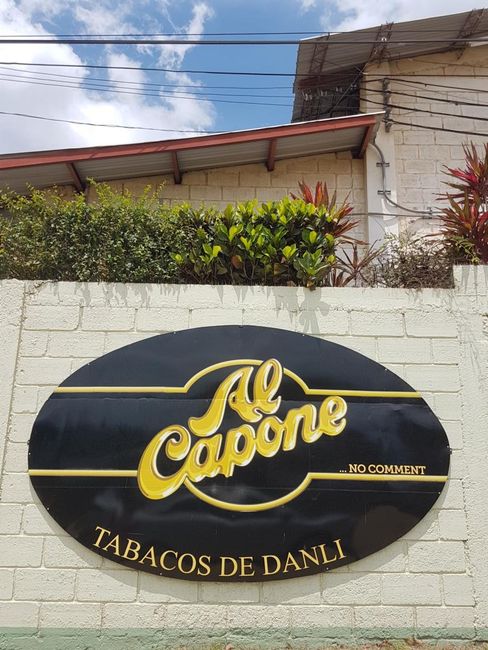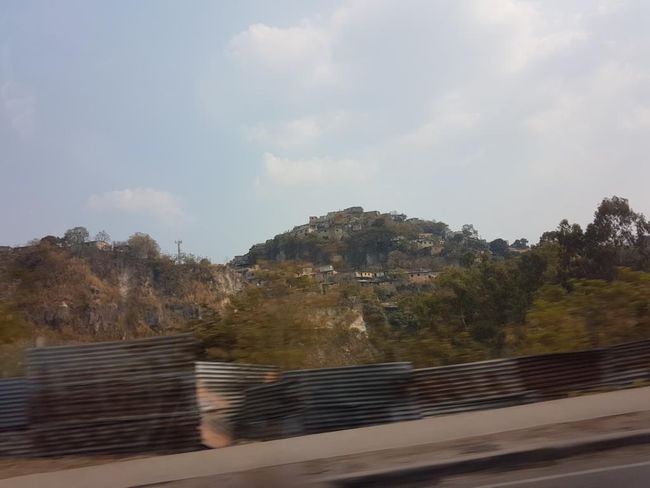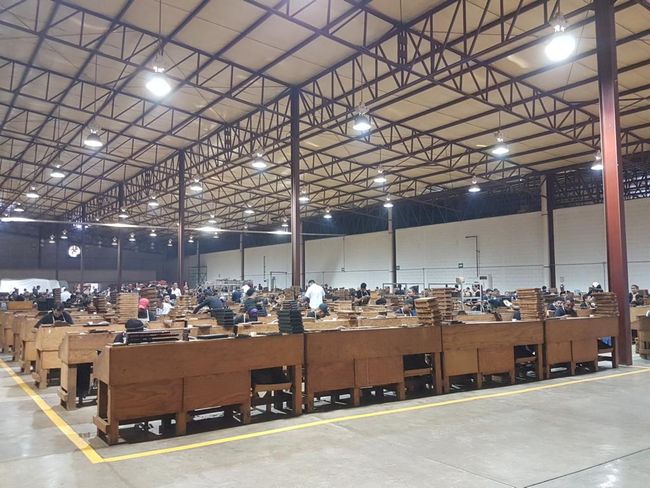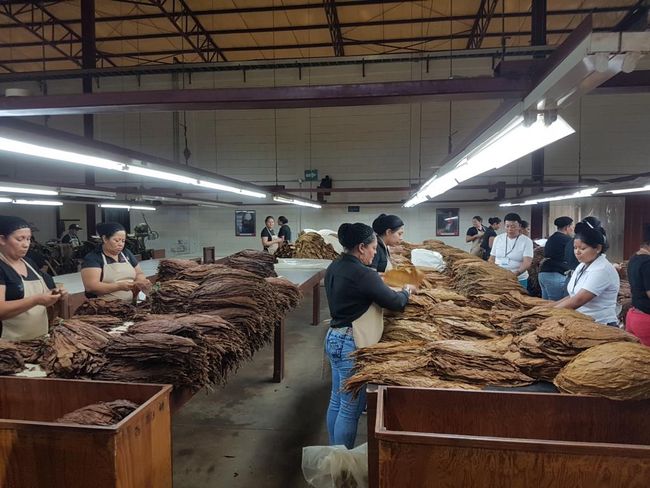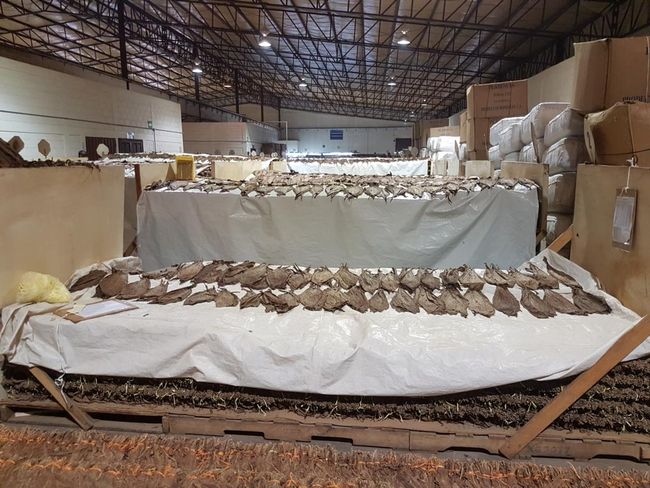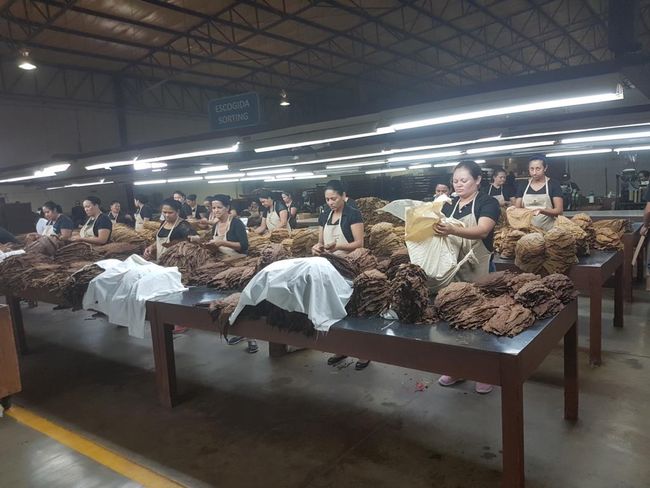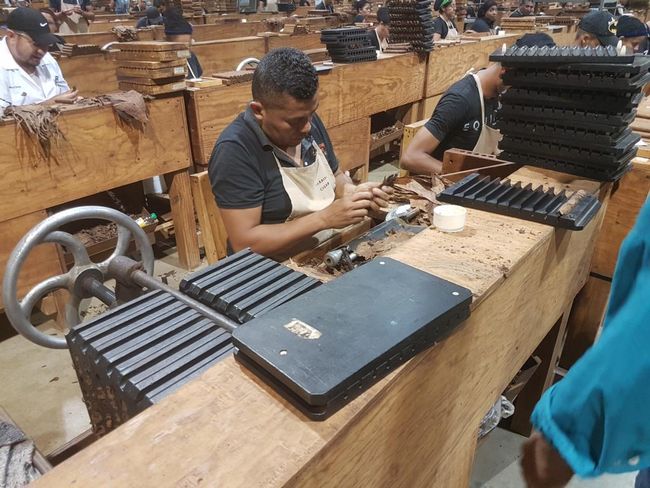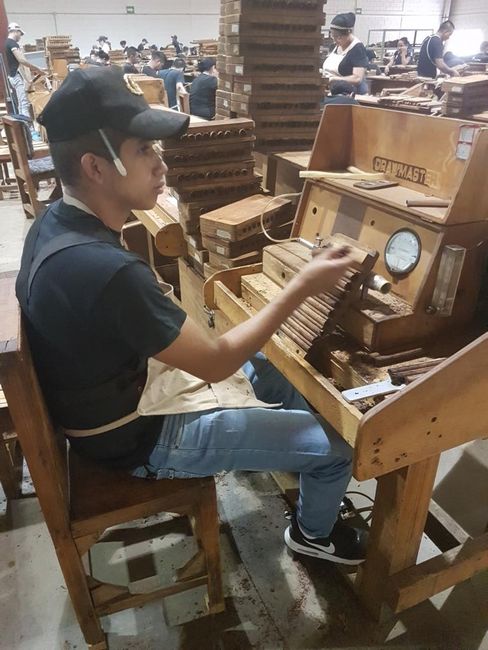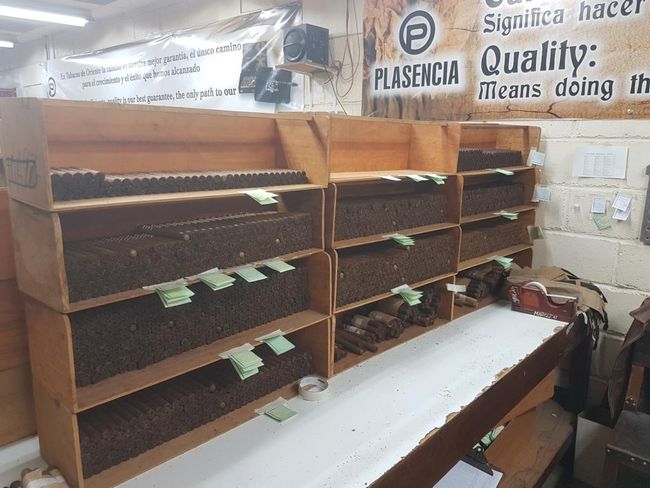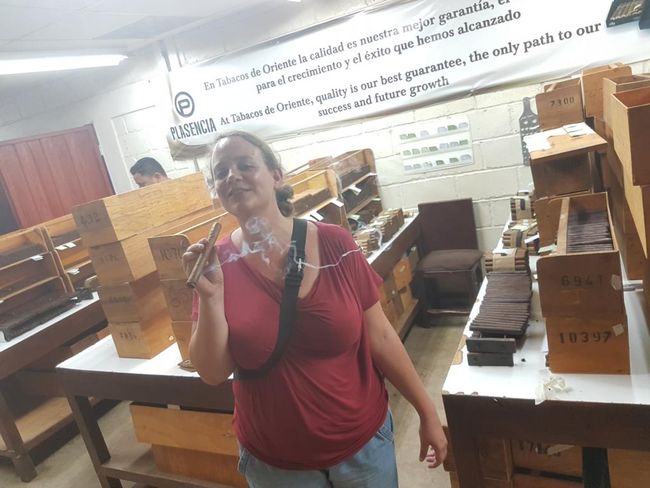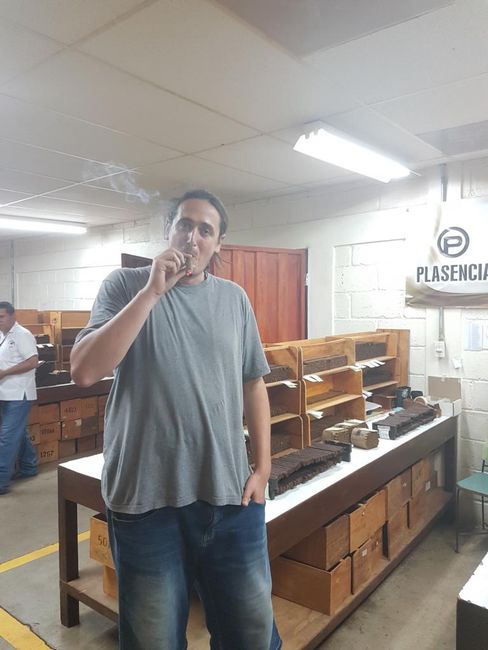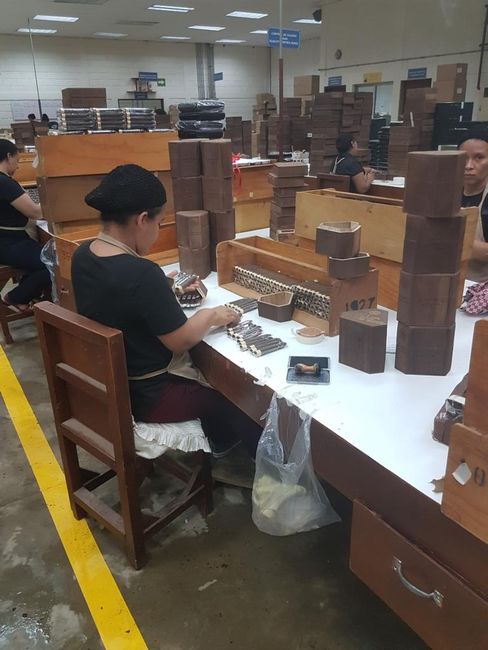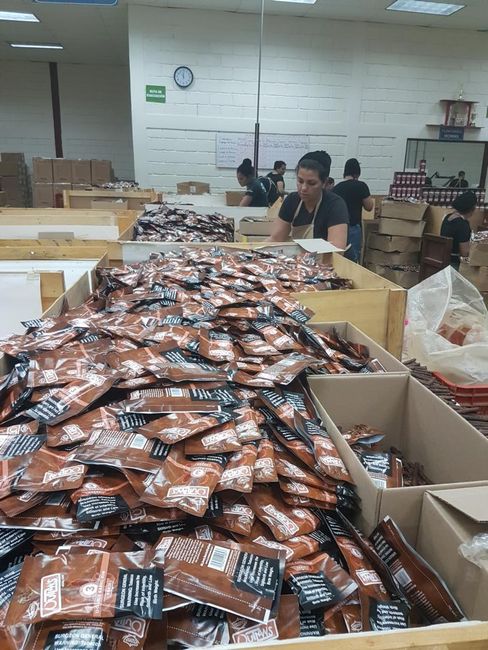Honduras: Danli
ئېلان قىلىندى: 01.05.2018
گېزىتلەرگە مۇشتەرى بولۇڭ
From La Venta we drove to Danli, which is not on the typical gringo trail. We came here to visit a cigar factory owned by the company Jörg's father used to work for. The factory doesn't usually offer tours to the public, but we had the honor of being personally invited and accompanied by the factory manager Rafael.
Right after our arrival, Rafael contacted us and invited us to have dinner together. He had another Swiss colleague visiting, so the four of us went to a steakhouse, which is considered the best restaurant in Danli. And indeed, we enjoyed the best beef we've had in Central America so far. It was really delicious, a convivial evening, and we were very grateful for the generous invitation.
The next morning, we met Rafael at the factory as agreed. The factory produces Al Capone Cigarrillos, which are mainly distributed in the US market. That's why the production location in Honduras makes sense, as there are various trade agreements between the countries that facilitate the import of cigars. Interestingly, the tobacco is not produced here, but imported from Indonesia, which surprised me. But the explanation was simple: using different tobacco would change the taste of the product in a way that the customer would notice. Therefore, the same tobacco is always used, and there is no switch to local products.
At the beginning of the tour, we entered a large hall where the "Rolleros" worked: the women and men who roll the Cigarrillos. This is the most delicate production step and is done strictly by hand. The Rolleros need a lot of practice and experience for this task. Over 300 people work here as Rolleros, and Rafael explained that there are more women because they have more skill for this work. With a smile, he also assured me that women receive the same pay as men, as we had just talked about gender inequality in the workplace the night before. I think that's great! The workers are paid based on the quantity of Cigarillos produced, about 500 Cigarrillos are rolled by one Rollero per day.
The emphasis is on quality, and there are regular quality checks throughout the process. The "heart" of the cigar is the outermost leaf, the "Wrap," which is also the most expensive component. The Rollero must handle it very carefully so that it doesn't tear and fits tightly all around, not loose or wrinkled. The Wraps distributed to the Rolleros are weighed, and a maximum rejection rate of 2% is expected!
I must say, I have great respect for these people. It's tough to do such work, with 500 repetitive movements per day for 9 hours, 5 days a week, and for many years. And yet, they must stay focused, efficient, and produce high-quality work. In my younger years, I worked in a JOWA bakery for a while, where I had the pleasure of rolling ham pastries and topping frozen pizzas on a production line for days on end. It may sound simple, but it's really physical labor, and the monotony was a personal agony for me. And cigar rolling requires even more precision than distributing a few olives on a pizza, and it must be done under constant time pressure.
After the rolling process, the Cigarillos are cut and packaged. The well-known "Sweets" Cigarillos are sprayed with a sweet liquid before they are packaged. The composition of the liquid is a trade secret. Most of these process steps are fully automated, with some modern facilities available for this purpose. The finished products are then stored in large refrigerated rooms and await shipping.
Unfortunately, we weren't allowed to take photos during the factory tour, and I won't provide too many details and facts that we learned. However, we greatly appreciated Rafael taking so much time to answer all our questions. It was, of course, a great experience to have a private tour with the boss. Thanks, René!
The night before, Rafael had asked us if we were interested in visiting a "Puro" factory, where the large cigars are made. Of course, we were! So after the tour at Al Capone, we were sent to another company just outside Danli, Plasencia. When we arrived at the huge, impressive entrance gate, we gave the guard the name that Rafael had scribbled on a piece of paper for us. They were already expecting us... oh man, I have never felt so VIP-like before. 😊
Once again, we were given a private tour of the factory, this time in Spanish, and we were able to ask all our questions again. As I mentioned before, Puros are made here, the large cigars. The products are also intended for the US market.
The tobacco used here is locally grown. All subsequent production steps take place in the factory, from fermentation to packaging. The employee responsible for fermentation takes a big drag from his huge cigar before explaining the various aspects of his work to us. Depending on the height of harvest on the plant, the leaves yield stronger or weaker tobacco. After fermentation, all tobacco leaves are sorted by strength and quality. Women also predominantly work in this area. There is also a large central room where the Rolleros work. They always work in teams of two: one rolls the inside of the cigar, the other rolls the "Wrap" around it. The division of tasks remains the same, there is no swapping. The next quality control is done with a blowing device. An employee checks each individual cigar with a small machine to see if it allows enough air to pass through or if it is rolled too tightly and therefore "doesn't draw" when smoked. Before packaging, there is another extensive quality check. The employees who work here were previously Rolleros themselves. No external staff is hired for quality control because it requires a lot of experience. The employee we meet here is apparently very proud of his work and shows us some examples of poor quality, such as cigars with air holes inside. He happily smokes a fat cigar while explaining and also offers us some of the rejected cigars to try. Keep in mind, these are cigars that can quickly cost $30-50 each! And so we continue our tour, smoking our cigars, along with our guide. Smoking is allowed everywhere in the factory. They live by the motto that workers produce better products when they can taste the products themselves. Of course, nobody is forced to smoke, and the vast majority of employees don't smoke themselves.
Finally, we also see the packaging department here. Nothing is done automatically, and all the work is done by hand.
5000 people work for the company in Honduras, and another 5000 in Nicaragua. Our guide proudly explains that at least 40,000 people (10,000 families) are supported by the work in these factories.
From the first process step, sowing the tobacco plant, to the last step, lighting the finished cigar, it takes 3.5 years, and the product goes through 540 hands. That is truly impressive!
Our guide is from Nicaragua and is a passionate cigar smoker and enthusiast, and you can feel that. He has only been working here for the company for 2 months! Well, someone seems to have found their dream job!
Again, we thank them for their time and hospitality and say goodbye.
It was really interesting to visit this factory. We had visited a similar one in Cuba before, but the visit there was limited to watching a single man roll a single cigar. Afterwards, we were led to the salesroom, where cigars were pushed on us. It was completely unauthentic, purely a tourist spectacle with a clear sales goal. Here, we had the opportunity to tour the entire production facility and learn about all the process steps of cigar production. And since we were the only visitors, we also had the opportunity to bombard our guide with all our questions. Truly a unique opportunity.
If we now compare the two visited factories a bit, what stands out? The cultural difference is more than clear! The Al Capone factory is bright, clean, almost sterile, and smoking is out of the question. It's quiet in the room except for the sounds of work, and some Rolleros listen to music with headphones. The facilities are modern, the production steps spatially divided, organized, everything is tidy. Somehow typically European...
The Puro factory appears somehow more run-down, darker and gloomier. Smoking is allowed everywhere. It's loud everywhere, loud, booming music plays in the Rolleros' room. Nothing is industrialized, everything is done by hand, there are no machines. Everything seems a bit chaotic and disordered. Somehow typically Central American...
After this exciting morning, we leave Danli behind and head towards Parque Nacional La Tigra.
گېزىتلەرگە مۇشتەرى بولۇڭ
جاۋاب
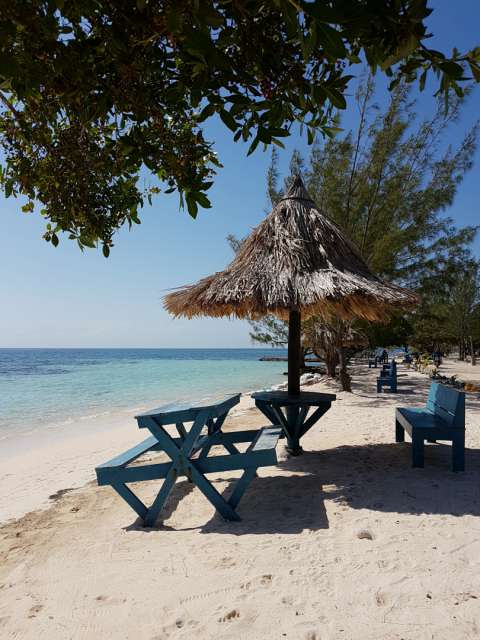
ساياھەت دوكلاتى Honduras

